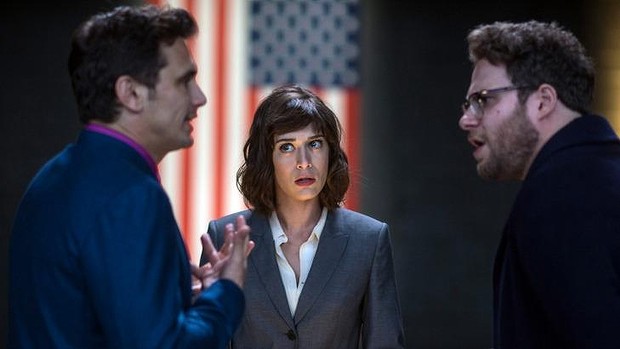 Back to selection
Back to selection
The Reel Distribution Politik of The Interview
 The Interview
The Interview The year’s most fascinating entertainment story gets even more so today, as the Seth Rogen/James Franco North Korea-baiting The Interview becomes available for online rental and purchase via YouTube, Google Play and Sony’s own site, with a limited theatrical release occurring tomorrow. (As I post this, Sony’s site just reveals the film’s poster art.) Only days after issuing a statement saying the studio “had no plans” to release the film, it has suddenly become the poster child for the day-and-date exhibition of a studio release — a distribution strategy the theater chains have been balking at for years.
From Todd Spangler at Variety:
“It has always been Sony’s intention to have a national platform on which to release this film,” said Michael Lynton, Chairman and CEO of Sony Entertainment. “With that in mind, we reached out to Google, Microsoft and other partners last Wednesday, December 17th, when it became clear our initial release plans were not possible. We are pleased we can now join with our partners to offer the film nation-wide today.”
The studio released the details on the streaming on Christmas Eve — a week after it had announced that it would not release the film due to threats of a terrorist attack on theaters showing the comedy. The developments to make The Interview available come after Lynton said in a CNN interview last Friday that no video-on-demand providers were willing to release the movie.
At Deadline, David Robb and Mike Fleming report on the anger Sony’s move has caused with exhibitors:
We’ve heard from exhibitors that days ago, Sony was back channel imploring them to cancel the film so that the studio wouldn’t have to be seen caving to terrorists. Now, everybody expects this small theater rollout to accompany a VOD rollout, possibly the same day. We are awaiting news on that front. This would destroy the film’s theatrical viability and would further infuriate NATO and major theater owners, who don’t participate in that part of the program. That, and the simple ridiculousness of expecting to change Christmas plans so close to the date, are creating the kind of anger no one should feel in the middle of the holiday season….
“This is another misstep for Sony,” an exhibition source told Deadline. “Releasing it simultaneously on VOD is against the clear desire of the theater owners. This is going to be another thing that Sony is going to have to repair with exhibition, especially after Sony threw theater owners under the bus last week when they blamed the theaters for pulling the wide release. Theater owners had asked for a delay so that they could address the security issues, and Sony pulled the release. And when President Obama criticized Sony, their response was to blame theater owners.”
I’m sure conspiracy theorists will emerge claiming that, following the hack, this was Sony’s plan all along — to drum up interest in an online release while blaming theaters for refusing to show the film. But as someone intrigued by conspiracy theory but who generally defaults to Occam’s Razor, it appears to me as if a series of Sony fumbles, assisted by the intervention of President Barack Obama, led us to this situation. That said, while most other Hollywood films will have a hard time generating the scale of pre-release publicity The Interview has received, the film’s release has opened a Pandora’s Box of sorts for the kind of new-era releasing models many have been advocating for. If the release is successful and box-office and VOD results are publicized, there will undoubtedly be pressure on both studio distribution arms and exhibitors to alter the models upon which Hollywood films are released today.
But, with regards to the movie itself, Hollywood economics are only part of the story. The Sony hack is a model for the next generation of international conflict, with targets being corporate and industrial, attackers a mixture of nations and hacktavist groups, and strikes less crippling infrastructure takedowns and more lower-level intrusions intended to destroy corporate property, create insecurity and disrupt patterns of trade. And it’s when considering the origins of the Sony hack that Occam’s Razor begins to break down. The U.S. government has declared North Korea to be responsible, but security expert Bruce Scheier is not so sure. He outlines five different scenarios, ranging from “North Korea did it” to “it was an inside job” to somewhere in-between, like this theory:
The initial attack was not a North Korean government operation, but was co-opted by the government. There’s no reason to believe that the hackers who initially stole the information from Sony are the same ones who threatened the company over the movie. Maybe there are several attackers working independently. Maybe the independent North Korean hackers turned their work over to the government when the job got too big to handle. Maybe the North Koreans hacked the hackers.
Of course, no one, from Sony’s Michael Lynton to Seth Rogen to Obama, wants you to think too hard about all of this right now. They’d rather you just do your patriotic duty as Americans and go see The Interview — or, better yet, download it.
